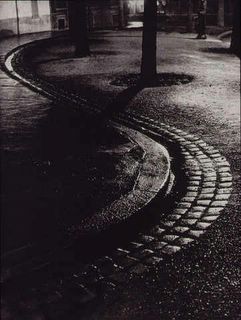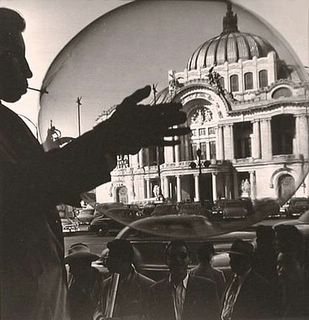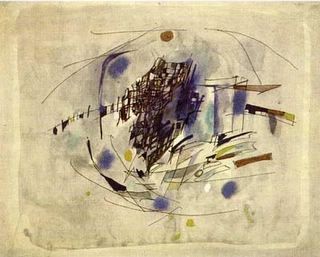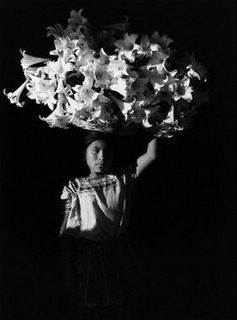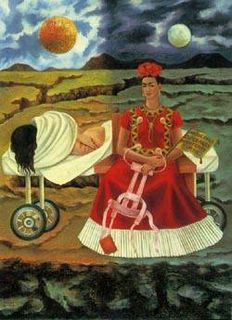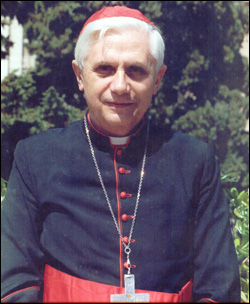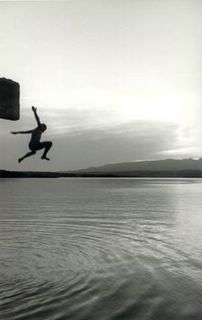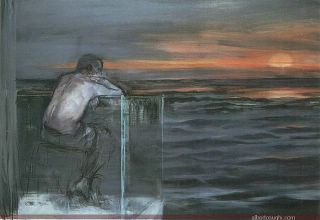Saturday, April 30, 2005
Amor
Amor - Salvador Novo
Amar es este tímido silencio
cerca de ti sin que lo sepas,
y recordar tu voz cuando te marchas
y sentir el calor de tu saludo.
Amar es aguardarte
como si fueras parte del ocaso
ni antes ni después para que estemos
solos
entre los juegos y los cuentos
sobre la tierra seca.
Amar es percibir, cuando te ausentas
tu perfume en el aire que respiro
y contemplar la estrella en que te alejas
cuando cierro la puerta de la noche.
Amar es este tímido silencio
cerca de ti sin que lo sepas,
y recordar tu voz cuando te marchas
y sentir el calor de tu saludo.
Amar es aguardarte
como si fueras parte del ocaso
ni antes ni después para que estemos
solos
entre los juegos y los cuentos
sobre la tierra seca.
Amar es percibir, cuando te ausentas
tu perfume en el aire que respiro
y contemplar la estrella en que te alejas
cuando cierro la puerta de la noche.
Friday, April 29, 2005
Pena de morte
No ano de 2004 mais de 3700 pessoas foram executadas em 25 países.
7395 foram sentenciados em 64 países.
A maioria das execuções na China, cerca de 3400, mas fontes dentro do país dizem que o número na realidade ronda as 10000 pessoas.
o Irão executou pelo menos 159 e o Vietnam 64. Os USA, país de primeiro mundo e grande bastião da democracia executou 59.
Mesmo continuando a existir em muitos países a pena capital foi abolida para todos os crimes em 5 países- Butão, Grécia, Samoa, Senegal e Turquia. No fim do ano de 2004 120 países tinham abolido a pena capital.
Portugal aboliu a pena de morte em 1911, mas durante a Primeira Guerra é readmitida, é finalmente abolida em Abril de 1976.
Na minha modesta opinião a pena de morte viola o direito à vida assegurado pela Declaração Universal dos Direitos Humanos e é uma total negação dos direitos humanos
7395 foram sentenciados em 64 países.
A maioria das execuções na China, cerca de 3400, mas fontes dentro do país dizem que o número na realidade ronda as 10000 pessoas.
o Irão executou pelo menos 159 e o Vietnam 64. Os USA, país de primeiro mundo e grande bastião da democracia executou 59.
Mesmo continuando a existir em muitos países a pena capital foi abolida para todos os crimes em 5 países- Butão, Grécia, Samoa, Senegal e Turquia. No fim do ano de 2004 120 países tinham abolido a pena capital.
Portugal aboliu a pena de morte em 1911, mas durante a Primeira Guerra é readmitida, é finalmente abolida em Abril de 1976.
Na minha modesta opinião a pena de morte viola o direito à vida assegurado pela Declaração Universal dos Direitos Humanos e é uma total negação dos direitos humanos
Thursday, April 28, 2005
Wednesday, April 27, 2005
O vento é um cavalo
El viento en la isla(Pablo Neruda)
El viento es un caballo:
óyelo cómo corre
por el mar, por el cielo.
Quiere llevarme:escucha
cómo recorre el mundo
para llevarme lejos.
Escóndeme en tus brazos
por esta noche sola,
mientras la lluvia rompe
contra el mar y la tierra
su boca innumerable.
Escucha como el viento
me llama galopando
para llevarme lejos.
Con tu frente en mi frente,
con tu boca en mi boca,
atados nuestros cuerpos
al amor que nos quema,
deja que el viento pase
sin que pueda llevarme.
Deja que el viento corra
coronado de espuma,
que me llame y me busque
galopando en la sombra,
mientras yo...sumergido
bajo tus grandes ojos,
por esta noche sola
descansaré, Amor mío.
El viento es un caballo:
óyelo cómo corre
por el mar, por el cielo.
Quiere llevarme:escucha
cómo recorre el mundo
para llevarme lejos.
Escóndeme en tus brazos
por esta noche sola,
mientras la lluvia rompe
contra el mar y la tierra
su boca innumerable.
Escucha como el viento
me llama galopando
para llevarme lejos.
Con tu frente en mi frente,
con tu boca en mi boca,
atados nuestros cuerpos
al amor que nos quema,
deja que el viento pase
sin que pueda llevarme.
Deja que el viento corra
coronado de espuma,
que me llame y me busque
galopando en la sombra,
mientras yo...sumergido
bajo tus grandes ojos,
por esta noche sola
descansaré, Amor mío.
Tuesday, April 26, 2005
Esquecimento
Esqueci-me ontém de mencionar que no dia 25 de Abril de 1945, representantes de 47 países reuniram-se, na Conferência de San Francisco - trabalharam até 26 de Junho, redigindo a Carta das Nações Unidas (ONU).
A carta diz:
CHAPTER I - PURPOSES AND PRINCIPLES
Article 1
The Purposes of the United Nations are:
1. To maintain international peace and security, and to that end: to take effective collective measures for the prevention and removal of threats to the peace, and for the suppression of acts of aggression or other breaches of the peace, and to bring about by peaceful means, and in conformity with the principles of justice and international law, adjustment or settlement of international disputes or situations which might lead to a breach of the peace;
2. To develop friendly relations among nations based on respect for the principle of equal rights and self-determination of peoples, and to take other appropriate measures to strengthen universal peace;
3. To achieve international co-operation in solving international problems of an economic, social, cultural, or humanitarian character, and in promoting and encouraging respect for human rights and for fundamental freedoms for all without distinction as to race, sex, language, or religion; and
4. To be a centre for harmonizing the actions of nations in the attainment of these common ends.
A carta diz:
CHAPTER I - PURPOSES AND PRINCIPLES
Article 1
The Purposes of the United Nations are:
1. To maintain international peace and security, and to that end: to take effective collective measures for the prevention and removal of threats to the peace, and for the suppression of acts of aggression or other breaches of the peace, and to bring about by peaceful means, and in conformity with the principles of justice and international law, adjustment or settlement of international disputes or situations which might lead to a breach of the peace;
2. To develop friendly relations among nations based on respect for the principle of equal rights and self-determination of peoples, and to take other appropriate measures to strengthen universal peace;
3. To achieve international co-operation in solving international problems of an economic, social, cultural, or humanitarian character, and in promoting and encouraging respect for human rights and for fundamental freedoms for all without distinction as to race, sex, language, or religion; and
4. To be a centre for harmonizing the actions of nations in the attainment of these common ends.
Stolen Child

Pachen Lama

Ontém dia 25 de Abril fez anos Gedhun Choekyi Nyima, o décimo primeiro Pachen Lama.
Seria um dia de alegria e felicidade para todos os tibetanos jé que este rapazinho de 16 anos é uma das figuras religiosas mais importantes do Tibete. Mas afinal não, foi um dia sombrio e triste.
Porquê?? Porque não há notícias de Gedhun, já que ele foi raptado da sua casa pelas autoridades chinesas alguns dias depois de ser reconhecido pela sua Santidade o Dalai Lama como o 11º Pachen Lama em 1995.
O governo chinês piorou a situação ao nomear uma pessoa para substituir o Pachen Lama, isto veio mostrar os esforços da China para suprimir a identidade do Tibete e controlar o seu futuro.
Durante os últimos 10 anos a China tem resistido aos apelos internacionais e continua sem dizer onde se encontra Gedhun, e tem maltratado os Budistas Tibetanos, que tentam praticar a sua religião e cultura.
Gedhun Choekyi Nyima tem o direito de viver com a sua família e praticar a sua religião e cultura de forma livre e aberta.
Monday, April 25, 2005
25 de Abril

Cravos

Abril de Abril
Era um Abril de amigo
Abril de trigo
Abril de trevo e trégua e vinho e húmus
Abril de novos ritmos novos rumos.
Era um Abril comigo Abril contigo
ainda só ardor e sem ardil
Abril sem adjectivo Abril de Abril.
Era um Abril na praça Abril de massas
era um Abril na rua Abril a rodos
Abril de sol que nasce para todos.
Abril de vinho e sonho em nossas taças
era um Abril de clava Abril em acto
em mil novecentos e setenta e quatro.
Era um Abril viril Abril tão bravo
Abril de boca a abrir-se Abril palavra
esse Abril em que Abril se libertava.
Era um Abril de clava Abril de cravo
Abril de mão na mão e sem fantasmas
esse Abril em que Abril floriu nas armas.
Manuel Alegre
Abre as Portas
Roque Dalton (El Salvador, 1935-1975)
Desnuda, de El turno del ofendido
"Amo tu desnudez
porque desnuda me bebes con los poros,
como hace el agua cuando entre sus paredes me sumerjo.
Tu desnudez derriba con su calor los límites,
me abre todas las puertas para que te adivine,
me toma de la mano como un niño perdido
que en ti dejara quietas su edad y sus preguntas.
Tu piel dulce y salobre que respiro y que sorbo
pasa a ser mi universo, el credo que me nutre;
la aromática lámpara que alzo estando ciego
cuando junto a las sombras los deseos me ladran.
Cuando te me desnudas con los ojos cerrados
cabes en una copa vecina de mi lengua,
cabes entre mis manos como el pan necesario,
cabes bajo mi cuerpo más cabal que su sombra.
El día en que te mueras te enterraré desnuda
para que limpio sea tu reparto en la tierra,
para poder besarte la piel en los caminos,
trenzarte en cada río los cabellos dispersos.
El día en que te mueras te enterraré desnuda,
como cuando naciste de nuevo entre mis piernas. "
Desnuda, de El turno del ofendido
"Amo tu desnudez
porque desnuda me bebes con los poros,
como hace el agua cuando entre sus paredes me sumerjo.
Tu desnudez derriba con su calor los límites,
me abre todas las puertas para que te adivine,
me toma de la mano como un niño perdido
que en ti dejara quietas su edad y sus preguntas.
Tu piel dulce y salobre que respiro y que sorbo
pasa a ser mi universo, el credo que me nutre;
la aromática lámpara que alzo estando ciego
cuando junto a las sombras los deseos me ladran.
Cuando te me desnudas con los ojos cerrados
cabes en una copa vecina de mi lengua,
cabes entre mis manos como el pan necesario,
cabes bajo mi cuerpo más cabal que su sombra.
El día en que te mueras te enterraré desnuda
para que limpio sea tu reparto en la tierra,
para poder besarte la piel en los caminos,
trenzarte en cada río los cabellos dispersos.
El día en que te mueras te enterraré desnuda,
como cuando naciste de nuevo entre mis piernas. "
Sunday, April 24, 2005
I have a dream
I HAVE A DREAM
By Dr. Martin L. King Jr.
[Delivered on the steps at the Lincoln Memorial in Washington D.C. on August 28, 1963]
I am happy to join with you today in what will go down in history as the greatest demonstration for freedom in the history of our nation.
Five score years ago, a great American, in whose symbolic shadow we stand today, signed the Emancipation Proclamation. This momentous decree came as a great beacon light of hope to millions of Negro slaves, who had been seared in the flames of withering injustice. It came as a joyous daybreak to end the long night of their captivity. But one hundred years later, the Negro still is not free. One hundred years later, the life of the Negro is still sadly crippled by the manacles of segregation and the chains of discrimination.
One hundred years later, the Negro lives on a lonely island of poverty in the midst of a vast ocean of material prosperity. One hundred years later, the Negro is still languished in the corners of American society and finds himself an exile in his own land. So we've come here today to dramatize a shameful condition.
In a sense we have come to our nation's capital to cash a check. When the architects of our republic wrote the magnificent words of the Constitution and the Declaration of Independence, they were signing a promissory note to which every American was to fall heir. This note was a promise that all men, yes, black men as well as white men, would be guaranteed the inalienable rights of life, liberty and the pursuit of happiness.
It is obvious today that America has defaulted on this promissory note insofar as her citizens of color are concerned. Instead of honoring this sacred obligation, America has given the Negro people a bad check, a check which has come back marked "insufficient funds."
But we refuse to believe that the bank of justice is bankrupt. We refuse to believe that there are insufficient funds in the great vaults of opportunity of this nation. So we have come to cash this check, a check that will give us upon demand the riches of freedom and the security of justice.
We have also come to this hallowed spot to remind America of the fierce urgency of Now. This is no time to engage in the luxury of cooling off or to take the tranquilizing drug of gradualism. Now is the time to make real the promises of democracy. Now is the time to rise from the dark and desolate valley of segregation to the sunlit path of racial justice. Now is the time to lift our nation from the quicksands of racial injustice to the solid rock of brotherhood. Now is the time to make justice a reality for all of God's children.
It would be fatal for the nation to overlook the urgency of the moment. This sweltering summer of the Negro's legitimate discontent will not pass until there is an invigorating autumn of freedom and equality. Nineteen sixty-three is not an end but a beginning. Those who hope that the Negro needed to blow off steam and will now be content will have a rude awakening if the nation returns to business as usual.
There will be neither rest nor tranquility in America until the Negro is granted his citizenship rights. The whirlwinds of revolt will continue to shake the foundations of our nation until the bright day of justice emerges.
But there is something that I must say to my people who stand on the warm threshold which leads into the palace of justice. In the process of gaining our rightful place we must not be guilty of wrongful deeds. Let us not seek to satisfy our thirst for freedom by drinking from the cup of bitterness and hatred. We must ever conduct our struggle on the high plane of dignity and discipline. We must not allow our creative protest to degenerate into physical violence. Again and again we must rise to the majestic heights of meeting physical force with soul force.
The marvelous new militancy which has engulfed the Negro community must not lead us to a distrust of all white people, for many of our white brothers, as evidenced by their presence here today, have come to realize that their destiny is tied up with our destiny. They have come to realize that their freedom is inextricably bound to our freedom. We cannot walk alone.
And as we walk, we must make the pledge that we shall always march ahead. We cannot turn back. There are those who are asking the devotees of civil rights, "When will you be satisfied?" We can never be satisfied as long as the Negro is the victim of the unspeakable horrors of police brutality. We can never be satisfied as long as our bodies, heavy with the fatigue of travel, cannot gain lodging in the motels of the highways and the hotels of the cities. We cannot be satisfied as long as a Negro in Mississippi cannot vote and a Negro in New York believes he has nothing for which to vote. No, no, we are not satisfied and we will not be satisfied until justice rolls down like waters and righteousness like a mighty stream.
I am not unmindful that some of you have come here out of great trials and tribulations. Some of you have come fresh from narrow jail cells. Some of you have come from areas where your quest for freedom left you battered by the storms of persecutions and staggered by the winds of police brutality. You have been the veterans of creative suffering. Continue to work with the faith that unearned suffering is redemptive. Go back to Mississippi, go back to Alabama, go back to South Carolina, go back to Georgia, go back to Louisiana, go back to the slums and ghettos of our northern cities, knowing that somehow this situation can and will be changed. Let us not wallow in the valley of despair. I say to you today, my friends, so even though we face the difficulties of today and tomorrow. I still have a dream. It is a dream deeply rooted in the American dream.
I have a dream that one day this nation will rise up and live out the true meaning of its creed; we hold these truths to be self-evident that all men are created equal.
I have a dream,
that one day on the red hills of Georgia the sons of former slaves and the sons of former slave owners will be able to sit down together at the table of brotherhood.
I have a dream,
that one day even the state of Mississippi, a state sweltering with the heat of injustice, sweltering with the heat of oppression, will be transformed into an oasis of freedom and justice.
I have a dream,
that my four little children will one day live in a nation where they will not be judged by the color of their skin but by the content of their character.
I have a dream today!
I have a dream that one day, down in Alabama, with its vicious racists, with its governor having his lips dripping with the words of interposition and nullification; one day right down in Alabama little black boys and black girls will be able to join hands with little white boys and white girls as sisters and brothers. I have a dream today!
I have a dream that one day every valley shall be exalted, and every hill and mountain shall be made low, the rough places will be made plain and the crooked places will be made straight and the glory of the Lord shall be revealed and all flesh shall see it together.
This is our hope. This is the faith that I will go back to the South with. With this faith we will be able to hew out of the mountain of despair a stone of hope. With this faith we will be able to transform the jangling discords of our nation into a beautiful symphony of brotherhood. With this faith we will be able to work together, to pray together, to struggle together, to go to jail together, to stand up for freedom together, knowing that we will be free one day. This will be the day, this will be the day when all of God's children will be able to sing with new meaning "My country 'tis of thee, sweet land of liberty, of thee I sing. Land where my fathers died, land of the Pilgrim's pride, from every mountainside, let freedom ring!" And if America is to be a great nation, this must become true.
And so let freedom ring
from the prodigious hilltops of New Hampshire.
Let freedom ring from the mighty mountains of New York.
Let freedom ring from the heightening Alleghenies of Pennsylvania.
Let freedom ring from the snow-capped Rockies of Colorado.
Let freedom ring from the curvaceous slopes of California.
But not only that.
Let freedom ring from Stone Mountain of Georgia.
Let freedom ring from Lookout Mountain of Tennessee.
Let freedom ring from every hill and molehill of Mississippi, from every mountainside,
let freedom ring! And when this happens, when we allow freedom to ring, when we let it ring from every village and every hamlet, from every state and every city, we will be able to speed up that day when all of God's children, black men and white men, Jews and Gentiles, Protestants and Catholics, will be able to join hands and sing in the words of the old Negro spiritual, "Free at last, free at last. Thank God Almighty, we are free at last."
By Dr. Martin L. King Jr.
[Delivered on the steps at the Lincoln Memorial in Washington D.C. on August 28, 1963]
I am happy to join with you today in what will go down in history as the greatest demonstration for freedom in the history of our nation.
Five score years ago, a great American, in whose symbolic shadow we stand today, signed the Emancipation Proclamation. This momentous decree came as a great beacon light of hope to millions of Negro slaves, who had been seared in the flames of withering injustice. It came as a joyous daybreak to end the long night of their captivity. But one hundred years later, the Negro still is not free. One hundred years later, the life of the Negro is still sadly crippled by the manacles of segregation and the chains of discrimination.
One hundred years later, the Negro lives on a lonely island of poverty in the midst of a vast ocean of material prosperity. One hundred years later, the Negro is still languished in the corners of American society and finds himself an exile in his own land. So we've come here today to dramatize a shameful condition.
In a sense we have come to our nation's capital to cash a check. When the architects of our republic wrote the magnificent words of the Constitution and the Declaration of Independence, they were signing a promissory note to which every American was to fall heir. This note was a promise that all men, yes, black men as well as white men, would be guaranteed the inalienable rights of life, liberty and the pursuit of happiness.
It is obvious today that America has defaulted on this promissory note insofar as her citizens of color are concerned. Instead of honoring this sacred obligation, America has given the Negro people a bad check, a check which has come back marked "insufficient funds."
But we refuse to believe that the bank of justice is bankrupt. We refuse to believe that there are insufficient funds in the great vaults of opportunity of this nation. So we have come to cash this check, a check that will give us upon demand the riches of freedom and the security of justice.
We have also come to this hallowed spot to remind America of the fierce urgency of Now. This is no time to engage in the luxury of cooling off or to take the tranquilizing drug of gradualism. Now is the time to make real the promises of democracy. Now is the time to rise from the dark and desolate valley of segregation to the sunlit path of racial justice. Now is the time to lift our nation from the quicksands of racial injustice to the solid rock of brotherhood. Now is the time to make justice a reality for all of God's children.
It would be fatal for the nation to overlook the urgency of the moment. This sweltering summer of the Negro's legitimate discontent will not pass until there is an invigorating autumn of freedom and equality. Nineteen sixty-three is not an end but a beginning. Those who hope that the Negro needed to blow off steam and will now be content will have a rude awakening if the nation returns to business as usual.
There will be neither rest nor tranquility in America until the Negro is granted his citizenship rights. The whirlwinds of revolt will continue to shake the foundations of our nation until the bright day of justice emerges.
But there is something that I must say to my people who stand on the warm threshold which leads into the palace of justice. In the process of gaining our rightful place we must not be guilty of wrongful deeds. Let us not seek to satisfy our thirst for freedom by drinking from the cup of bitterness and hatred. We must ever conduct our struggle on the high plane of dignity and discipline. We must not allow our creative protest to degenerate into physical violence. Again and again we must rise to the majestic heights of meeting physical force with soul force.
The marvelous new militancy which has engulfed the Negro community must not lead us to a distrust of all white people, for many of our white brothers, as evidenced by their presence here today, have come to realize that their destiny is tied up with our destiny. They have come to realize that their freedom is inextricably bound to our freedom. We cannot walk alone.
And as we walk, we must make the pledge that we shall always march ahead. We cannot turn back. There are those who are asking the devotees of civil rights, "When will you be satisfied?" We can never be satisfied as long as the Negro is the victim of the unspeakable horrors of police brutality. We can never be satisfied as long as our bodies, heavy with the fatigue of travel, cannot gain lodging in the motels of the highways and the hotels of the cities. We cannot be satisfied as long as a Negro in Mississippi cannot vote and a Negro in New York believes he has nothing for which to vote. No, no, we are not satisfied and we will not be satisfied until justice rolls down like waters and righteousness like a mighty stream.
I am not unmindful that some of you have come here out of great trials and tribulations. Some of you have come fresh from narrow jail cells. Some of you have come from areas where your quest for freedom left you battered by the storms of persecutions and staggered by the winds of police brutality. You have been the veterans of creative suffering. Continue to work with the faith that unearned suffering is redemptive. Go back to Mississippi, go back to Alabama, go back to South Carolina, go back to Georgia, go back to Louisiana, go back to the slums and ghettos of our northern cities, knowing that somehow this situation can and will be changed. Let us not wallow in the valley of despair. I say to you today, my friends, so even though we face the difficulties of today and tomorrow. I still have a dream. It is a dream deeply rooted in the American dream.
I have a dream that one day this nation will rise up and live out the true meaning of its creed; we hold these truths to be self-evident that all men are created equal.
I have a dream,
that one day on the red hills of Georgia the sons of former slaves and the sons of former slave owners will be able to sit down together at the table of brotherhood.
I have a dream,
that one day even the state of Mississippi, a state sweltering with the heat of injustice, sweltering with the heat of oppression, will be transformed into an oasis of freedom and justice.
I have a dream,
that my four little children will one day live in a nation where they will not be judged by the color of their skin but by the content of their character.
I have a dream today!
I have a dream that one day, down in Alabama, with its vicious racists, with its governor having his lips dripping with the words of interposition and nullification; one day right down in Alabama little black boys and black girls will be able to join hands with little white boys and white girls as sisters and brothers. I have a dream today!
I have a dream that one day every valley shall be exalted, and every hill and mountain shall be made low, the rough places will be made plain and the crooked places will be made straight and the glory of the Lord shall be revealed and all flesh shall see it together.
This is our hope. This is the faith that I will go back to the South with. With this faith we will be able to hew out of the mountain of despair a stone of hope. With this faith we will be able to transform the jangling discords of our nation into a beautiful symphony of brotherhood. With this faith we will be able to work together, to pray together, to struggle together, to go to jail together, to stand up for freedom together, knowing that we will be free one day. This will be the day, this will be the day when all of God's children will be able to sing with new meaning "My country 'tis of thee, sweet land of liberty, of thee I sing. Land where my fathers died, land of the Pilgrim's pride, from every mountainside, let freedom ring!" And if America is to be a great nation, this must become true.
And so let freedom ring
from the prodigious hilltops of New Hampshire.
Let freedom ring from the mighty mountains of New York.
Let freedom ring from the heightening Alleghenies of Pennsylvania.
Let freedom ring from the snow-capped Rockies of Colorado.
Let freedom ring from the curvaceous slopes of California.
But not only that.
Let freedom ring from Stone Mountain of Georgia.
Let freedom ring from Lookout Mountain of Tennessee.
Let freedom ring from every hill and molehill of Mississippi, from every mountainside,
let freedom ring! And when this happens, when we allow freedom to ring, when we let it ring from every village and every hamlet, from every state and every city, we will be able to speed up that day when all of God's children, black men and white men, Jews and Gentiles, Protestants and Catholics, will be able to join hands and sing in the words of the old Negro spiritual, "Free at last, free at last. Thank God Almighty, we are free at last."
Saturday, April 23, 2005
Dia Mundial do Livro

Ler

O poeta é um fingidor.
Finge tão completamente
Que chega a fingir que é dor
A dor que deveras sente.
E os que lêem o que escreve,
Na dor lida sentem bem,
Não as duas que ele teve,
Mas só a que eles não têm.
E assim nas calhas de roda
Gira, a entreter a razão,
Esse comboio de corda
Que se chama coração.
Fernando Pessoa
Coldplay
Vem aí o novo CD de Coldplay, a banda adiou para Junho o lançamento do seu terceiro CD.
A 23 de Maio sai o primeiro single, intitulado, "Speed of Sound". Mas existe já uma faixa ( Talk) a rodar na internet, uma parceria entre os Coldplay e Kraftwerk.
O álbum “X&Y” marca a volta da banda que não lançava nenhum trabalho desde 2002.
O terceiro álbum será lançado no dia 6 de Junho e a banda inicia a tornée pela Europa.
A banda começará a sua tornée em Inglaterra, com duas noites no Crystal Palace Athletics Stadium em Londres.
Alguns títulos do novo CD dos Coldplay são 'Square One', 'Talk' (com um riff de guitarra tirado de 'Computer Love' dos Kraftwerk), 'Till Kingdom Come', 'X&Y', 'What If' y 'The Hardest Part'.
A 23 de Maio sai o primeiro single, intitulado, "Speed of Sound". Mas existe já uma faixa ( Talk) a rodar na internet, uma parceria entre os Coldplay e Kraftwerk.
O álbum “X&Y” marca a volta da banda que não lançava nenhum trabalho desde 2002.
O terceiro álbum será lançado no dia 6 de Junho e a banda inicia a tornée pela Europa.
A banda começará a sua tornée em Inglaterra, com duas noites no Crystal Palace Athletics Stadium em Londres.
Alguns títulos do novo CD dos Coldplay são 'Square One', 'Talk' (com um riff de guitarra tirado de 'Computer Love' dos Kraftwerk), 'Till Kingdom Come', 'X&Y', 'What If' y 'The Hardest Part'.
Friday, April 22, 2005
Não conseguimos sozinhos
U2 Sometimes you can't make it on your own
Tough, you think you've got the stuff
You're telling me and anyone
You're hard enough
You don't have to put up a fight
You don't have to always be right
Let me take some of the punches
For you tonight
Listen to me now
I need to let you know
You don't have to go it alone
Sometimes you can't make it on your own
Sometimes you can't make it on your own
When I was a young boy, in the suburb of cedarwood
I wanted to be great
'Cause good would not be good enough
Now that I'm older
I don't see things any clearer
Nearer now, but still a long way off
Listen to me now
I need to let you know
You don't have to go it alone
Sometimes you can't make it on your own
Sometimes you can't make it on your own
(Can, you, hear, me, when, I) sing
You're the reason I sing
You're the reason why the opera is in me
Hey now, gotta let you know
A house still don't make a home
Don't leave me here alone
Sometimes you can't make it on your own
Sometimes you can't make it on your own
Sometimes you can't make it
Best you can do is to fake it
Sometimes you can't make it on your own
Tough, you think you've got the stuff
You're telling me and anyone
You're hard enough
You don't have to put up a fight
You don't have to always be right
Let me take some of the punches
For you tonight
Listen to me now
I need to let you know
You don't have to go it alone
Sometimes you can't make it on your own
Sometimes you can't make it on your own
When I was a young boy, in the suburb of cedarwood
I wanted to be great
'Cause good would not be good enough
Now that I'm older
I don't see things any clearer
Nearer now, but still a long way off
Listen to me now
I need to let you know
You don't have to go it alone
Sometimes you can't make it on your own
Sometimes you can't make it on your own
(Can, you, hear, me, when, I) sing
You're the reason I sing
You're the reason why the opera is in me
Hey now, gotta let you know
A house still don't make a home
Don't leave me here alone
Sometimes you can't make it on your own
Sometimes you can't make it on your own
Sometimes you can't make it
Best you can do is to fake it
Sometimes you can't make it on your own
Thursday, April 21, 2005
The Interpreter

The Interpreter

Uma intérprete das Nações Unidas, sem querer houve uma conversa, que a leva a um mundo de intriga.
Este thriller político tem como principal actriz, Nicole Kidman, que uma vez mais tem uma óptima interpretação.
O filme gira em torno de uma pequena nação africana, chamada Matobo, e da suposta tentativa de assassinato do seu presidente e ditador Zuwaine.
Um agente dos serviços secretos, Sean Penn, vem tentar descobrir mais sobre esta mulher e ao investigar descobre um passado cheio de violência e corrupção. O realizador é Sidney Pollack que tem um pequeno papel.
Não vos conto mais porque perderia a piada, mas posso dizer que é um filme com uma óptima construção, maravilhosas imagens de Nova Iorque, em especial das Nações Unidas, cheio de intriga e energia.
"You can always rely on Sydney Pollack's intelligence and gifted filmmaking; his authority on screen is matched by his ability to wrap a thriller around some serious material."-- Urban Cinefile Critics, URBAN CINEFILE
Wednesday, April 20, 2005
Gritarei
Gritarei - Samih Al Qassim
Enquanto me restem algumas polegadas de terra
Enquanto me reste uma oliveira
Uma laranjeira
Um poço... um bosquezinho de cactus
Enquanto me restem lembranças
Um pequena biblioteca
A foto de um antepassado... um muro
Enquanto restem em meu país palavras árabes
E cantos populares,
Enquanto restem manuscritos de poemas
E os contos de Antar Al’Absi
As guerras do apelo nas comarcas de Roma e da Pérsia
Enquanto me restem olhos
Livros MãosEnquanto me reste... alento
Gritarei de frente ao inimigo
Gritarei, declaração de guerra
Em nome de homens livres
Operários, estudantes, poetas
Gritarei... e que os parasitas
E os inimigos do sol
Se fartem do pão da vergonha
Enquanto me reste alento
E alento me restará
Minha palavra será o pão e a alma
Entre as mãos dos guerriheiros
Enquanto me restem algumas polegadas de terra
Enquanto me reste uma oliveira
Uma laranjeira
Um poço... um bosquezinho de cactus
Enquanto me restem lembranças
Um pequena biblioteca
A foto de um antepassado... um muro
Enquanto restem em meu país palavras árabes
E cantos populares,
Enquanto restem manuscritos de poemas
E os contos de Antar Al’Absi
As guerras do apelo nas comarcas de Roma e da Pérsia
Enquanto me restem olhos
Livros MãosEnquanto me reste... alento
Gritarei de frente ao inimigo
Gritarei, declaração de guerra
Em nome de homens livres
Operários, estudantes, poetas
Gritarei... e que os parasitas
E os inimigos do sol
Se fartem do pão da vergonha
Enquanto me reste alento
E alento me restará
Minha palavra será o pão e a alma
Entre as mãos dos guerriheiros
Tuesday, April 19, 2005
Aprender com o vento
Imparare dal vento - Tiromancino
Vorrei imparare dal vento a respirare, dalla pioggia a cadere
Dalla corrente a portare le cose dove non vogliono andare
E avere la pazienza delle onde di andare e venire
Ricominciare a fluire
Un aereo passa veloce e io mi fermo a pensare
A tutti quelli che partono, scappano o sono
sospesi
Per giorni, mesi, anni
In cui ti senti come uno che si è perso
Tra obiettivi ogni volta più grandi
Succede perchè in un istante tutto il resto diventa invisibile
Privo di senso ed irraggiungibile
per me
Succede perchè fingo che va sempre tutto bene
Ma non lo penso in fondo
Torneremo ad avere più tempo e a camminare
Per le strade che abbiamo scelto che a volte fanno male
Per avere la pazienza delle onde di andare e venire
E non riesci a capire....
Succede perchè in un istante tutto il resto diventa invisibile
Privo di senso ed irraggiungibile
per me
Succede anche se il vento porta tutto via con sè
Vivendo
Ricominciare a fluire
Vorrei imparare dal vento a respirare, dalla pioggia a cadere
Dalla corrente a portare le cose dove non vogliono andare
E avere la pazienza delle onde di andare e venire
Ricominciare a fluire
Un aereo passa veloce e io mi fermo a pensare
A tutti quelli che partono, scappano o sono
sospesi
Per giorni, mesi, anni
In cui ti senti come uno che si è perso
Tra obiettivi ogni volta più grandi
Succede perchè in un istante tutto il resto diventa invisibile
Privo di senso ed irraggiungibile
per me
Succede perchè fingo che va sempre tutto bene
Ma non lo penso in fondo
Torneremo ad avere più tempo e a camminare
Per le strade che abbiamo scelto che a volte fanno male
Per avere la pazienza delle onde di andare e venire
E non riesci a capire....
Succede perchè in un istante tutto il resto diventa invisibile
Privo di senso ed irraggiungibile
per me
Succede anche se il vento porta tutto via con sè
Vivendo
Ricominciare a fluire
Monday, April 18, 2005
Toco a tua boca
Julio Cortázar (Argentina, 1914-1984)
Rayuela (fragmento)
"Toco tu boca, con un dedo toco el borde de tu boca, voy dibujándola como si saliera de mi mano, como si por primera vez tu boca se entreabriera, y me basta cerrar los ojos para deshacerlo todo y recomenzar, hago nacer cada vez la boca que deseo, la boca que mi mano elige y te dibuja en la cara, una boca elegida entre todas, con soberana libertad elegida por mí para dibujarla con mi mano en tu cara, y que por un azar que no busco comprender coincide exactamente con tu boca que sonríe por debajo de la que mi mano te dibuja. Me miras, de cerca me miras, cada vez más de cerca y entonces jugamos al cíclope, nos miramos cada vez más de cerca y los ojos se agrandan, se acercan entre sí, se superponen y los cíclopes se miran, respirando confundidos, las bocas se encuentran y luchan tibiamente, mordiéndose con los labios, apoyando apenas la lengua en los dientes, jugando en sus recintos donde un aire pesado va y viene con perfume viejo y un silencio. Entonces mis manos buscan hundirse en tu pelo, acariciar lentamente la profundidad de tu pelo mientras nos besamos como si tuviéramos la boca llena de flores o de peces, de movimientos vivos, de fragancia oscura. Y si nos mordemos el dolor es dulce, y si nos ahogamos en un breve y terrible absorber simultáneo de aliento, esa instantánea muerte es bella. Y hay una sola saliva y un solo sabor a fruta madura, y yo te siento temblar contra mí como una luna en el agua. "
Rayuela (fragmento)
"Toco tu boca, con un dedo toco el borde de tu boca, voy dibujándola como si saliera de mi mano, como si por primera vez tu boca se entreabriera, y me basta cerrar los ojos para deshacerlo todo y recomenzar, hago nacer cada vez la boca que deseo, la boca que mi mano elige y te dibuja en la cara, una boca elegida entre todas, con soberana libertad elegida por mí para dibujarla con mi mano en tu cara, y que por un azar que no busco comprender coincide exactamente con tu boca que sonríe por debajo de la que mi mano te dibuja. Me miras, de cerca me miras, cada vez más de cerca y entonces jugamos al cíclope, nos miramos cada vez más de cerca y los ojos se agrandan, se acercan entre sí, se superponen y los cíclopes se miran, respirando confundidos, las bocas se encuentran y luchan tibiamente, mordiéndose con los labios, apoyando apenas la lengua en los dientes, jugando en sus recintos donde un aire pesado va y viene con perfume viejo y un silencio. Entonces mis manos buscan hundirse en tu pelo, acariciar lentamente la profundidad de tu pelo mientras nos besamos como si tuviéramos la boca llena de flores o de peces, de movimientos vivos, de fragancia oscura. Y si nos mordemos el dolor es dulce, y si nos ahogamos en un breve y terrible absorber simultáneo de aliento, esa instantánea muerte es bella. Y hay una sola saliva y un solo sabor a fruta madura, y yo te siento temblar contra mí como una luna en el agua. "
Sunday, April 17, 2005
Lenda dos Vulcões

Popocatépetl y Iztaccihuatl - Akos Piros

Lenda azteca dos vulcões Popo ( montanha com fumo) e Izta (mulher adormecida)
Iztaccihuatl, hace ya miles de años,
fue la princesa más parecida a una flor,
que de la tribu de los viejos caciques
del Capitán más gentil se enamoró.
El padre augustamente abrió los labios
y dijole al Capitán seductor,
que si tomaba un día la cabeza del cacique enemigo,
en su vara y lanzón.
Encontraría preparados,
a un mismo tiempo
el festín de su triunfo y el lecho de su amor.
Y Popocatépetl fuese a la guerra
con esta esperanza en el corazón
domo la rebeldía de las selvas obstinadas,
el motín de los riscos contra su paso vencedor,
La osadía despeñada de los torrentes,
y la acechanza de los pantanos en traición;
y contra cientos y cientos de soldados,
años de años gallardamente combatió.
Al fin torno a la tribu,
y la cabeza del Cacique enemigo
sangraba en su lanzón.
Hallo el festín del triunfo preparado,
pero no así el lecho de su amor;
en vez de lecho encontró el túmulo.
En que su novia,
dormida bajo el sol esperaba
en su frente el beso póstumo de la boca
que nunca en vida la beso
Y Popocatépetl quebró en sus rodillas
el haz de las flechas;
y, en una sorda voz conjuro
las sombras de sus antepasados
contra las crueldades de su impasible Dios.
Era la vida suya, muy suya,
porque contra la muerte la gano;
tenia la riqueza; el poderío;
pero no tenia el amor...
Entonces, hizo que veinte mil esclavos
alzaran un gran túmulo ante el sol:
amontono diez cumbres en una escalinata
como de alucinación;
Tomo en sus brazos a la mujer amada,
y él mismo sobre el túmulo la coloco;
luego, encendió una antorcha, Y,
para siempre, quedo en pie
Alumbrando el sarcófago de su dolor.
Duerme en paz, Iztaccihuatl;
nunca los tiempos borraran los perfiles
de tu casta expresión.
Vela en paz, Popocatépetl;
nunca los huracanes apagaran
tu antorcha eterna de amor.
Saturday, April 16, 2005
Friday, April 15, 2005
Aprendi a dizer o teu nome
A viúva de Juan Rulfo (escritor mexicano), Clara Aparicio, guardou as 81 cartas que o seu marido lhe enviou entre os anos de 1944 e 1950. Cartas que agora se publicam num livro chamado Aire de las colinas.
"He aprendido a decir tu nombre mientras duermo. Lo he aprendido a decir entre la noche iluminada. Clara: corazón, rosa, amor… Junto a tu nombre el dolor es una cosa extraña".
São textos de amor e vida. Cartas que serviam para seduzir Clara. São poemas que nos mostram a alma de Juan Rulfo, todas elas nos ajudam a comprender como se forjou a sua vida e como esta alcançou a eternidade literária.
"Desde que te conozco, hay un eco en cada rama que repite tu nombre; en las ramas altas, lejanas; en las ramas que están junto a nosotros, se oye. Se oye como si despertáramos de un sueño en el alba. Se respira en las hojas, se mueve como se mueven las gotas del agua".
"He aprendido a decir tu nombre mientras duermo. Lo he aprendido a decir entre la noche iluminada. Clara: corazón, rosa, amor… Junto a tu nombre el dolor es una cosa extraña".
São textos de amor e vida. Cartas que serviam para seduzir Clara. São poemas que nos mostram a alma de Juan Rulfo, todas elas nos ajudam a comprender como se forjou a sua vida e como esta alcançou a eternidade literária.
"Desde que te conozco, hay un eco en cada rama que repite tu nombre; en las ramas altas, lejanas; en las ramas que están junto a nosotros, se oye. Se oye como si despertáramos de un sueño en el alba. Se respira en las hojas, se mueve como se mueven las gotas del agua".
Thursday, April 14, 2005
Chill out
Bajofondo Tango Club é um grupo de artistas e músicos que criam um leque de sons, baseado na fusão da electrónica juntando-os com os sons tradicionais do tango.
O seu fundador é um pioneiro da música rock latina, chama-se Gustavo Santaolalla, músico e produtor argentino conhecido por toda a américa latina.
O primeiro albúm dos Bajofondo Tango Club conseguiu platina na Argentina e ganhou vários prémios, um deles o Latin Grammy as Best Pop Instrumental Album.
O albúm chama-se Tangoclub, e é fenomenal, para quem gosta de chill out e de todas essas fusões deve sem dúvida comprar.
O tango mesmo com melancolia dança-se com paixão, juntos, pegados. A música electrónica dança-se na multidão, separados. Juntando os dois há química. A fusão entre estes dois tipos de som é um atrevimento e até sacrilégio mas é sempre bem-vinda.
Tango e Electrónica. Partes iguais de respeito e irreverência.
"Bajofondo Tango Club is drama you can dance to"
O seu fundador é um pioneiro da música rock latina, chama-se Gustavo Santaolalla, músico e produtor argentino conhecido por toda a américa latina.
O primeiro albúm dos Bajofondo Tango Club conseguiu platina na Argentina e ganhou vários prémios, um deles o Latin Grammy as Best Pop Instrumental Album.
O albúm chama-se Tangoclub, e é fenomenal, para quem gosta de chill out e de todas essas fusões deve sem dúvida comprar.
O tango mesmo com melancolia dança-se com paixão, juntos, pegados. A música electrónica dança-se na multidão, separados. Juntando os dois há química. A fusão entre estes dois tipos de som é um atrevimento e até sacrilégio mas é sempre bem-vinda.
Tango e Electrónica. Partes iguais de respeito e irreverência.
"Bajofondo Tango Club is drama you can dance to"
Never again

Nagasaki

"On August 9, 1945, the American B-29 bomber, Bock's Car left Tinian carrying Fat Man, a plutonium implosion-type bomb. The primary target was the Kokura Arsenal, but upon reaching the target, they found that it was covered by a heavy ground haze and smoke, pilot Charles Sweeney turned to the secondary target of the Mitsubishi Torpedo Plant at Nagasaki.
Of the 286,00 people living in Nagasaki at the time of the blast, 74,000 were killed and another 75,000 sustained severe injuries."
Wednesday, April 13, 2005
Eternidade
L'Eternità
by Giorgia
Ci troveremo ancora
più grandi e più sinceri in una lacrima
e parleremo ancora
di cieli immensi e avremo nuove verità.
Dimmi se ti ho deluso
e quanto hai pianto senza di me
io di pensarti non ho smesso neanche un attimo
e quanto dura l’eternità.
Ci abbracceremo ancora
più stretti di un anello che non toglierò
e chiederemo al mondo che male abbiamo fatto per restare qui.
Dimmi se ti ho perduto
e quante volte hai cercato me
io di pensarti non ho smesso neache un attimo
ci meritiamo l’eternità.
Dimmi se, senti me,
come fossimo una cosa sola
una foglia in mezzo a questo vento
che ci ha portato l’eternità, l’eternità, l’eternità…
Il tempo è già finito
lo spazio è aperto davanti a noi
che siamo come diamanti
pronti a non spezzarsi mai
ci meritiamo l’eternità.
L’eternità, l’eternità…
by Giorgia
Ci troveremo ancora
più grandi e più sinceri in una lacrima
e parleremo ancora
di cieli immensi e avremo nuove verità.
Dimmi se ti ho deluso
e quanto hai pianto senza di me
io di pensarti non ho smesso neanche un attimo
e quanto dura l’eternità.
Ci abbracceremo ancora
più stretti di un anello che non toglierò
e chiederemo al mondo che male abbiamo fatto per restare qui.
Dimmi se ti ho perduto
e quante volte hai cercato me
io di pensarti non ho smesso neache un attimo
ci meritiamo l’eternità.
Dimmi se, senti me,
come fossimo una cosa sola
una foglia in mezzo a questo vento
che ci ha portato l’eternità, l’eternità, l’eternità…
Il tempo è già finito
lo spazio è aperto davanti a noi
che siamo come diamanti
pronti a non spezzarsi mai
ci meritiamo l’eternità.
L’eternità, l’eternità…
Clara cordilheira

Chile - Torres del Paine

"...dejame darte algunas Flores de Chile,
algunas hojas de rocío salvaje,
algunas raíces, inesperadamente ciegas.
Andando entre la clara cordillera del Oeste
y el desencadenado material del océano
hay, allá lejos, una tierra terrible,
hermosa como la piel palpitante del puma."
Pablo Neruda
Tuesday, April 12, 2005
VJ Day
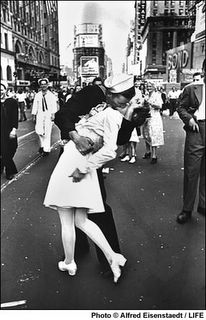
Alfred Eisemstaedt- VJ Day

Nasceu em 1898 em Dierschaul. A sua primeira reportagem foi a entrega dos Prémios Nobel, em 1929, ano em que Thomas Mann ganhou o Nobel da literatura.
Em 1935 emigrou para os Estados Unidos e trabalhou para a Harper`s Bazaar, Vogue y Town and Country. Mas foi na revista LIFE que ganhou prestigio, tornando-se colaborador permanente em 1936.
É conhecido como o pai do fotojornalismo.
When I married in 1949, my wife asked me. 'But where are your real cameras?' I never carried a lot of equipment. My motto has always been, 'Keep it simple.'"
